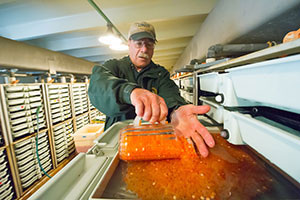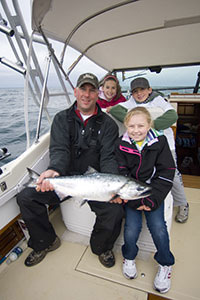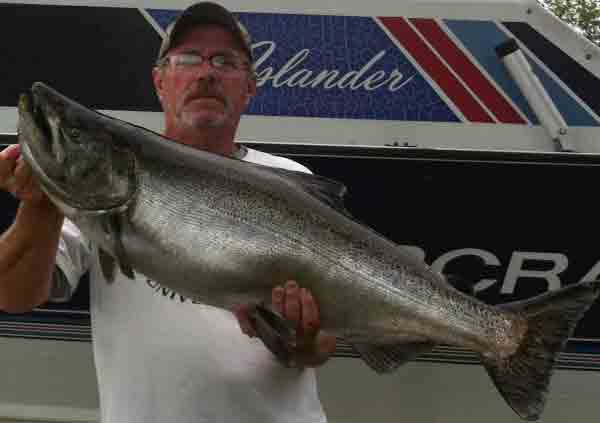- Details
(Provided by MDNR)
As Michigan inches toward spring, anglers may want to plan an outing to target coho salmon in Lake Michigan. The coho season is open all year but activity really starts to pick up this month.
Coho salmon have a pretty consistent migration pattern every year, starting in the southern portion of Lake Michigan and moving north into New Buffalo, St. Joseph, South Haven and sometimes Muskegon before they cross the width of the lake for much of the summer.
In 2016, anglers who ventured out into 200 feet of water, which can be more than 10 miles offshore from most ports, found coho feeding on shrimp-like species called "mysis." Mysis populations appear to be doing well in this deeper water, and coho respond favorably when feeding on this nutrient-rich food source.
- Details
(Provided by MDNR)
 Salmon and Trout Egg-Take Efforts Ongoing at DNR FacilitiesThe Michigan DNR has been working hard this fall to gather necessary eggs for the continued production of hatchery fish to support management objectives for Michigan's world-class fisheries.
Salmon and Trout Egg-Take Efforts Ongoing at DNR FacilitiesThe Michigan DNR has been working hard this fall to gather necessary eggs for the continued production of hatchery fish to support management objectives for Michigan's world-class fisheries.
Fall egg-takes have been completed, or are starting soon, for wild Chinook and coho salmon and for captive broodstocks of brown, rainbow, brook and lake trout.
Chinook salmon eggs were collected Oct. 4 and Oct. 20 at the Little Manistee River Weir and Oct. 11 from the Swan River Weir near Rogers City. Collection of coho salmon eggs began Oct. 17 at the Platte River State Fish Hatchery Weir and ended Oct. 27.
"We were expecting a limited run of wild Chinook salmon this year," said Aaron Switzer, manager of the state fish hatcheries located in the northern Lower Peninsula. "The run was very heavy to males, many of which were jacks (males that reach sexual maturity one year earlier than normal). Because of that, we needed to procure additional eggs from the Swan River rather than rely solely on the Little Manistee River."
- Details
(Provided by MDNR)
After significant negotiations with the other members of the Lake Michigan Committee (LMC) - which cooperatively manages fish populations in the lake - the Michigan DNR has finalized its salmon and trout stocking levels.
With the new stocking levels, the DNR seeks to protect the ecology of the lake by striking the right balance between predator and prey fish, while also protecting a diverse fishery. The new levels will begin in 2017 and be completed in 2018. The five-member Lake Michigan Committee comprises all state management agencies (Illinois, Indiana, Michigan and Wisconsin) that border Lake Michigan and the Chippewa-Ottawa Resource Authority. Recommendations from the committee represent the consensus of its members.
Under the lakewide agreement, stocking levels of salmon and trout from all state management agencies will be reduced by 1.77 million fish by 2018. This represents a 17-percent reduction from the average numbers stocked lakewide since 2013. Each state contributed to the stocking reduction to varying degrees to achieve the desired result across the lake.
Michigan anglers are not expected to see a significant impact from the new stocking levels. Over 70 percent of Chinook salmon harvested by Michigan anglers are wild and hatched in Michigan rivers. Of the stocked fish caught by Michigan anglers, the majority come from neighboring Wisconsin, which will maintain its Chinook salmon stocking at current levels.
Compared with other Lake Michigan Committee member states, Michigan made the smallest reduction in its overall stocking.
- Michigan will reduce lake trout by 270,000 fish, Chinook salmon by 230,000 fish and Coho salmon by 96,000 fish. These reductions represent 11 percent of all salmon and trout stocked by the DNR in Lake Michigan. In response to angler concerns about salmon stocking in particular, Michigan opted to cut fewer Chinook salmon than initially planned. The state originally had proposed cutting 360,000 Chinook only.
- Illinois will reduce 76,000 Chinook salmon and 4,000 lake trout (15 percent of all Illinois stocking).
- Indiana will reduce 123,000 Chinook salmon and 120,000 lake trout (21 percent of all Indiana stocking).
- Wisconsin will reduce its entire fish-stocking allocation by 25 percent, including a minimum of 517,000 lake trout and 350,000 brown trout. Wisconsin will continue to work with its stakeholders to refine its final reduction strategy.
"Fish don't know borders or boundaries, so it is critical that we work together as states toward a lakewide solution," said Jay Wesley, Lake Michigan Basin coordinator for the Michigan DNR and chair of the LMC. "The science solidly points to the need for change. These changes will help us achieve the important goal of a better balance of predator and prey. We will continue to annually monitor fish populations in the lake. The Lake Michigan Committee reviews this information annually and would recommend increasing stocking levels in the future if conditions are favorable."
Implementing this plan will take two years. Anglers may begin to see full effects of these actions in three to four years.
"The strategy now being deployed recognizes angler concerns throughout the basin, while seeking to maintain a vital fishery," said Michigan DNR Fisheries Chief Jim Dexter. "The Michigan DNR would not support a strategy that knowingly and substantially increases the risk of the fishery collapsing."
Dexter said that reducing salmon and trout stocking levels illustrates a shared commitment to protection of Lake Michigan's valuable fishery, even as the lake's ecosystem continues to shift quickly. Reduced food availability for prey fish, driven primarily by invasive mussels, has contributed to extensive shifts throughout the entire food web.
"Michigan citizens attach significant value to our Great Lakes and want to keep them strong and diverse," said Dexter. "We at the DNR are committed to making sure there are abundant fish for this generation and for the next."
Learn more about the changing ecology of Lake Michigan and its impact on salmon by watching a video on YouTube.
For additional information, visit the DNR's salmon web page, under Managing Michigan's Fisheries on the DNR website www.michigan.gov/fishing.
- Details
(Provided by MDNR)
 DNR Announces Stocking Adjustments for Michigan Waters of Lake MichiganFollowing recommendations of the Lake Michigan Committee, the Michigan DNR will adjust Chinook salmon and lake trout stocking in 2017 and 2018 to relieve predation pressure on prey (alewives) in Lake Michigan.
DNR Announces Stocking Adjustments for Michigan Waters of Lake MichiganFollowing recommendations of the Lake Michigan Committee, the Michigan DNR will adjust Chinook salmon and lake trout stocking in 2017 and 2018 to relieve predation pressure on prey (alewives) in Lake Michigan.
This will be the fourth significant stocking adjustment to predator levels since 1999. The five-member Lake Michigan Committee is made up from all state management agencies that border Lake Michigan and the Chippewa-Ottawa Resource Authority. Recommendations from the committee represent the consensus of its members.
The committee worked throughout the summer with interested anglers and constituents to amend a proposal that had substantially targeted only a Chinook salmon reduction to today's recommendation to reduce a mix of species to achieve the same reduction in predation pressure in Lake Michigan while recognizing the importance of Chinook.
- Details
(Provided by IDNR)
 Catches like this king salmon caught by Kevin Claire are going to become less frequent as Lake Michigan fish managers are cutting back on chinook salmon stockings.
Catches like this king salmon caught by Kevin Claire are going to become less frequent as Lake Michigan fish managers are cutting back on chinook salmon stockings.
Catches like this king salmon caught by Kevin Claire are going to become less frequent as Lake Michigan fish managers are cutting back on chinook salmon stockings." title="Catches like this king salmon caught by Kevin Claire are going to become less frequent as Lake Michigan fish managers are cutting back on chinook salmon stockings.
The DNR will temporarily cease stocking Chinook salmon in Lake Michigan in 2017 out of concern that there isn't enough food in the lake.





